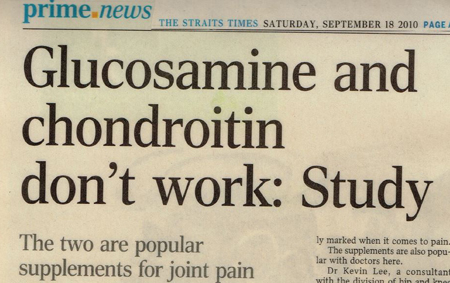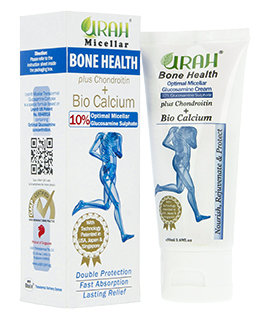
The two are popular supplements for joint pain
LONDON: Glucosamine and chondroitin, two supplements taken by millions of people around the world for joint pain, do not work, says a study by Swiss scientists.
The supplements, taken on their own or in combination to reduce pain caused by osteoarthritis in the hips and knees, should not be paid for by the health authorities or insurers, the study added.
In a review of trials involving 3,803 patients with knee or hip osteoarthritis, the Swiss researchers found that there was 'no clinically relevant effect' of chondroitin, glucosamine, or the two in combination on perceived joint pain.
'Health authorities and health insurers should not cover the costs for these preparations, and new prescriptions to patients who have not received treatment should be discouraged,' said Professor Peter Juni of the University of Bern, whose study was published in the British Medical Journal yesterday.
Osteoarthritis is the most common form of arthritis and is one of the leading causes of chronic disability in the United States. It affects about eight million people in Britain and nearly 27 million people in the US.
It is a chronic condition which is mainly treated with painkillers and anti-inflammatory drugs like aspirin and ibuprofen. Some of these drugs can cause stomach and heart problems, particularly if they are used for long periods.
Prof Juni's team said in its study that in the past decade, doctors and specialist rheumatologists have increasingly prescribed glucosamine and chondroitin to their patients, and people with joint pain also buy them over the counter.
According to their research, global sales of glucosamine supplements hit almost US$2 billion (S$2.7 billion) in 2008 - an increase of about 60 per cent since 2003.
The supplements became popular after researchers reported in The Lancet in 2001 that glucosamine may be one of the first products to prevent the worsening of osteoarthritis.
The researchers reviewed 10 previously published trials and assessed data on changes in levels of pain after patients took glucosamine, chondroitin, or a combination, compared with a placebo.
'Compared with placebo, glucosamine, chondroitin, and their combination do not reduce joint pain or have an impact on narrowing of joint space,' they wrote.
The scientists noted that despite this finding, some patients remained convinced that the supplements work.
They said this may be because of the naturally fluctuating course of osteoarthritis or due to a placebo effect, which can be particularly marked when it comes to pain.
The supplements are also popular with doctors here.
Dr Kevin Lee, a consultant with the division of hip and knee surgery at National University Hospital, said: 'Yes, I would continue prescribing glucosamine (in its sulphate form) for selected patients.
'These are patients with mild to moderate, and not severe, osteoarthritis. In the latter group, glucosamine sulphate will very likely not work.
'As an orthopaedic surgeon, I tell my patients clearly that glucosamine sulphate is essentially a mild anti-inflammatory agent with minimal side effects compared to standard painkillers and that is the reason I prescribe it to them. It has not been shown to regenerate cartilage in humans.'
He added that a second important point was that the quality and concentration of active ingredients in the huge variety of preparations available to patients vary widely.
'And studies have shown that taking certain brands (or) preparations is only as good as taking a placebo,' he said.
'My advice to patients is that if it does not seem to work after six months, then they should discontinue the supplements.'
Source: http://www.nuh.com.sg/news/media-articles_869.html
CLICK HERE TO CHECK THE QUALITY OF YOUR GLUCOSAMINE PRODUCT BEFORE USE
Click here to Check the Best Product for your Pain Condition
Click here for Urah users testimonies
Click here to Check the Quality of your Glucosamine Product before use

2026 © URAH Transdermal Pte Ltd. ALL Rights Reserved. Urah Privacy Policy | Terms of Service | Return Policy
Disclaimer: All contents on this website are provided for general information only, and should not be treated as a substitute for the medical advice of your Physician or any other health care professional. Urah is not responsible or liable for any diagnosis made by any user based on the content of this website. Always consult your own Physician if you're in any way concerned about your health. Urah Micellar Transdermal Cream formulae are not patented or under any patent rights.